The advice you get from Jordan Belfort — Leondardo DiCaprio in Martin Scorsese’s spiritual sequel to Goodfellas, The Wolf of Wall Street — isn’t too complex.
He tells you not to take ‘no’ for an answer.
Don’t be concerned with whether what you’re selling has any value, or if anyone needs it, or if they’ll even get it after it’s paid for. Just sell the damned thing so you can move on to the next sucker.
Watching this latest slice of the Oscar-season foie gras log, I come away feeling nothing for vapid Mr. Belfort, nor for his shiny-toothed compatriot Donnie Azoff (Jonah Hill), and even less for his entourage of saps, acolytes, and accouterments, of which Belfort’s sculpted second wife Naomi (Margot Robbie) plays a representative part.
That’s not so important. The more pertinent question is whether I left The Wolf of Wall Street feeling anything for the world in which Belfort runs amok. Our world.
Have you noticed how this December — like every other December — presents us with a compacted globule of highly touted films, all presupposed to be awards contenders? How Hollywood shoves these cinematic steals down our throats as if we were, for example, a herd of captive geese?
‘But,’ you sputter, ‘these films are all great! How can you complain about an overabundance of riches?’
‘Ask the goose and pass the foie gras,’ I reply.
What we’re discussing here, during the Oscar crush, is the cinematic equivalent of gout, and I mean that in the best possible way. The Wolf of Wall Street is a decadently rich film from a recognized grandmaster. It is about how to sell high, pun most definitely intended.
Will you buy what the man says will enrich you with enjoyment and insight, or will you make him take ‘no’ for an answer? C’mon. Eat it up, goosey. Tastes good! It is good!
When faced with a killer salesman — Jordan Belfort or Martin Scorsese or Leonardo DiCaprio — it takes concerted will to balk at what’s on offer.
Let’s see if we have it in us.
The film starts with Matthew McConaughey playing DiCaprio’s mentor. He drinks like the condemned, snorts coke at the luncheon table, and tells young Mr. Belfort that trading in stocks is all a fugazi. A ‘fugazi’ being a ruse; nothing but smoke and mirrors.
Brokers make money selling, not from what they sell, so sell it all and don’t stop selling. Jordan Belfort takes this lesson to heart, but McConaughey’s slippery Mark Hanna doesn’t last past Black Monday. From then on, it’s Belfort, Azoff, and an ever-growing host of total losers who manage to win. Or that’s how these characters are depicted in Terence Winter’s script.
First the good. The Wolf of Wall Street is as viscerally toothsome as you’d expect from the trailers. It is an excessive film about obscene abundance. There are long, captivating sequences within it that stand up against anything Scorsese has done in his exceptional career. Over its three-hour length, The Wolf of Wall Street pummels you with the ripe fruit of easy cash, lush sex, and abundant narcotics.
It doesn’t give you much to care about though and even less to believe.
Jordan Belfort — a real individual upon whose memoir this film is based — is as complex as tap water. He wants to be rich. He wants to be high. He wants to place his penis inside warm receptacles. These things he shall have in generous proportion. If he holds any regret for the lives he trammels on his way to wealth, they do not merit discussion.
Instead, we get comedy.
The Wolf of Wall Street pulses with more humor than you might expect, most of it aimed at groin level. I understand that the film uses the word ‘fuck’ more than any other non-fiction film but one. It is also generously decorated with lithe, nude, female flesh.
I assume, in contrast, that when we see Jonah Hill wanking his cock, high on Quaaludes, in the middle of a party, that the dong is prosthetic. You can receive that as good or bad news as pleases you.
There is little point in relating the further story of Jordan Belfort, as there is no mystery as to where the film will go. I could say the same about the story of Henry Hill in Goodfellas, but there’s a significant difference. I was fascinated and drawn to Henry Hill. Who he was, what he wanted, and how his world corroded all were captivating. He had a soul, even if it was perverted. He had friends that mattered to him more than money. Not so Mr. Belfort. His foibles are merely foibles — hiccoughs on the path to a private yacht. There is no consequence to anyone outside of Jordan Belfort worth mentioning, save an afterthought for Donnie.
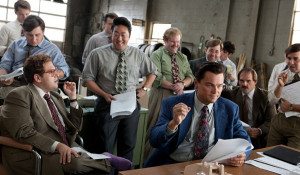
I wonder how Belfort’s friends felt about being depicted as losers. It makes me question how honest Belfort was about himself.
This brings me back to foie gras. Scorsese’s film is so decadent it’s tempting to gobble it up anyway, even if its very existence is tied to repercussion-free cruelty. Black Monday was real. Jordan Belfort is real. You can look up where he is today, should you care, and discover that he is not rotting in a cell, or buried up to the neck in worthless penny stocks while his cesspool fills with urine.
He’s still selling. He won’t take ‘no’ for an answer. This film is more than proof; it is another sales tool.
I thought The Wolf of Wall Street was hugely entertaining; DiCaprio and Hill destroying themselves on drugs makes three hours whip by; Scorsese’s unhurried bacchanal kept me alternating between clenching my teeth and recoiling in surprise and yet, I don’t know.
If we don’t act now we could miss the deal of the century and our chance at obscene wealth, but…
I suspect this deal is all smoke and mirrors. A fugazi.
I’ll pass.

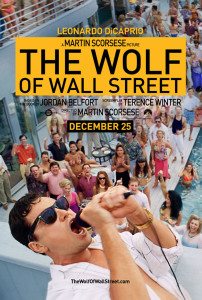

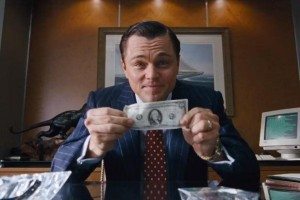
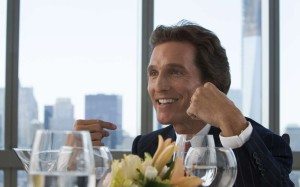


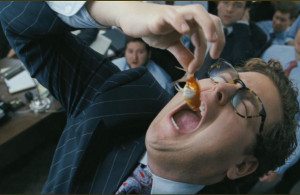
Good review. There were some repetitive moments to be found here, but overall, it was a very fun flick that never bored me. Not even for a single moment.
Thanks. It was fun and I also wasn’t bored. But it ended and I felt mostly unmoved. There was nothing to Jordan or any of the characters that lasted (McConaughey, Belfort’s first wife both disappeared).
Perhaps Scorsese was doing something intentional there; trying to show the emptiness of greed? I don’t think it particularly worked. Or didn’t work. It was just an enjoyable run at broad target. Although that whole Quaalude/Lamborghini scene won’t be forgotten anytime soon.
In retrospect, there were a lot of scenes that didn’t seem to add anything to the characters or the gentle story. The whole thing with the gay butler, for example? And I still have no idea if Belfort retrieved his $20M from Switzerland or if $20M was a large or small part of his holdings.
Good review and pretty spot on. I didn’t feel particularly moved, but I did feel disgusted with most of the characters so at least I didn’t feel that it glorified them. However, I think this film will work as a looking-glass for many folks. Those already disgusted with the decadent greed of Wall Street will feel the same. Those who aspire to greed and power might secretly be inspired.
As someone with a background in acting and theatre, I’m always willing to forgive any number of sins of plot and story if I get to watch an excellent or compelling performance. In this case, I think Jonah Hill delivers the finer piece of acting and makes the film worth watching alone. That isn’t to say DiCaprio puts in a poor performance, but I felt that Belfort is not a character that makes an actor ‘stretch’. To this day, I still think Leo’s performance in Django is the finest he has turned in and that it was a crime he didn’t even get a nod from the Academy.
I would like to see this movie again, but not sure I can endure the 3 hours, though.
Interesting point, Sean. I was just thinking today, as I strolled around with the dog, about the ending: where Belfort gives his motivational speech to a bunch of Kiwis (and, honestly, losers). I think Scorcese is implying that as messed up as Belfort’s life is, and as empty as it is, he’s still what we (the audience) want to be. And so the joke is on us if we can manage to laugh.
That fortune has become our goal, regardless of what it actually turns out to be.
So I don’t think WoWS glorifies Belfort, or stock brokers. It shows them as empty and soulless. And either you see that and shake your head in sorrow or you don’t. That said, it is odd that there is an actual Jordan Belfort who will likely benefit from this film. It leaves a sour taste in my mouth knowing that. It would have been just as easy and likely more effective to fictionalize the story.
As to the acting, I’ll bow to your expertise. I enjoyed both Hill and DiCaprio’s performances here. DiCaprio wasn’t pushed hard, but he was believable. Hill seemed more of a generic buffoon. I’m still trying to figure out why exactly he was of value to Stratford Oakmont, outside of his acquaintance with Steve Madden. He didn’t seem smart or capable or charming. Just good at making Belfort look good.
I enjoyed your review and found many insightful and interesting points in it. I do think, however, that you’re not giving the film the full credit it deserves in terms of it’s resonance and overall impact. I read in a comment of yours that you were pondering the film’s ending while walking your dog. Does that not demonstrate resonance? Personally, I caught myself thinking about this film many times for weeks after I saw it.
In my opinion, this is a densely layered film populated by superficial, shallow characters. Its depth comes from the sharp and intelligent commentary of not only the characteristically American preoccupations with money and power, but also the human fascination and delight in debauchery. Scorsese has crafted a consistently high octane examination of human darkness. The film also examines a person that has lost his ability to just sit and exist and be a person. I don’t recall any scene in the film in which the audience can spend a reflective moment with Belfort alone. Belfort seems to be constantly running away from a truth that lies in all of us. A very dark and sad truth. That we are truly alone and nothing matters. We, as humans, are forever empty. That’s what I think Scorsese is trying to communicate.
It’s a dark and cynical film, offset by its boisterous humor and exuberance.
P.S.
There are two key scenes that I remember well that comment on “the American Dream”. The first is the scene in which a swarm of brokers beg to work at Belfort’s company after Belfort was slammed in the newspapers calling him “the wolf of wall street”. The other scene is the last scene of the film with that poignant final shot. At the end, Belfort’s customers are not the suckers. His customers are striving to be the sucker-ers. Same goes for the brokers that beg to join his company near the beginning of the film. But that final shot in particular is just such a striking sight, when we the audience are finally confronted with ourselves. It’s as if the screen became a mirror. I think there’s some very profound stuff going on in this movie.
Thanks Bernardo.
I also see the messages you speak of, and appreciate their appearance in the scenes you mention; I just disagree about their impact. This is a three-hour film with something not too groundbreaking to say: we’re greedy and shallow. It says that with panache, certainly, but not in a way that made me introspective. Thinking about a film I’ve just spent hours writing about while walking the dog doesn’t mean a hell of a lot about the resonance of the film. I’m a film blogger; that’s my job.
Is Wolf of Wall Street really densely layered? From my read, it’s got one extremely loud and boorish level that never lets up. I see why Scorsese has made his choices, but don’t find them particularly effective. Belfort may be running from a dark and sad truth or he may be a cartoon character. There’s little in the film to make him human in any substantive way. I never cared for him in the slightest. That makes it a long haul dogging his heels.
As for the ending, I agree. There is a deliberate mirror set up. I think the profundity depends on who’s looking, though. Perhaps if you just spent three hours feeling envious of Belfort, you might cringe and reconsider his appeal. If you spent three hours feeling like he was a shithead who should have been emasculated with a spatula, well… the ending is wry, but less profound.
It’s a statement about the modern world (not just America), and I like it. I don’t think it’s a great film though.
The Wolf of Wall Street reviewed the way it should be.